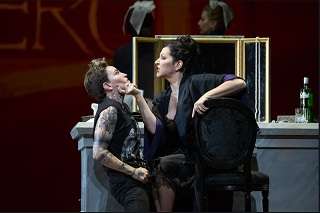|
Back
Resplendent Handel at the Met New York
Metropolitan Opera
02/06/2020 - & February 9, 13, 17, 22, 25, 29, March 3*, 7, 2020
George Frideric Handel: Agrippina, HWV 6
Joyce DiDonato (Agrippina), Kate Lindsey (Nerone), Duncan Rock (Pallante), Nicholas Tamagno (Narciso), Christian Zaremba (Lesbo), Iestyn Davies (Ottone), Brenda Rae (Poppea), Claudio (Matthew Rose)
Metropolitan Opera Orchestra and Chorus, Harry Bicket (conductor)
Sir David McVicar (production), John Macfarlane (sets and costumes), Paule Constable (lighting designer), Andrew George (choreographer)

K. Lindsey, J. DiDonato (© Marty Sohl)
Despite the world’s current woes, we at least live in a Handelian Renaissance. The Metropolitan Opera has been slow to catch up, long having left the composer’s works aside. But more than a decade after the collapse of the neighboring New York City Opera, which indulged in them to an admirable degree, and whose anemic rebirth has had little time for them, bolder Met repertoire choices are giving the eighteenth-century composer the New York platform he deserves.
Agrippina, one of the composer’s first operas, premiered in Venice in 1709 when he was just twenty-four years old, and after only five weeks of intense work. It preceded the pathbreaking Rinaldo by less than a year. Handel’s librettist Vincenzo Grimani was one of the grandest Roman cardinals, a fractious bunch who punctuated their lavish patronage of the arts with intrigues and power plays that recalled the excesses of Rome’s Julio-Claudian dynasty, the first to rise to imperial prominence before squandering it all on inbreeding, petty bickering, and mental illness. It does little justice to call Agrippina a case of “bad people doing bad things badly.” Its libretto, suffused with wry irony and arguably the best Handel ever set to music, could have served as worthy inspiration for the popular series House of Cards before it plunged into preposterous irrationality. Without getting too political, much of the public commentary argues that the opera is relevant to today’s political world, where allegations of collusion and treachery for the sake of power simply abound.
New York has not been unaware of Agrippina. City Opera’s production in its final proper season a dozen years ago gestured toward an update, placing the opera in a kind of decadent 1930s setting. Sir David McVicar’s production, a Met premiere, departs from his normal gray hues to give us something like modern Manhattan, suggested by a film projection of New York City street traffic when Poppea, the object of three men’s affections, runs out to hail a cab. The cunning title character prances about in the short black dress that has become a virtual uniform for female Manhattanites under fifty. Joyce DiDonato stunningly delivered the role’s dramatic narcissism – with all its tempers and vices – while conquering its musical challenges with a precision that could easily make this her greatest role to date. The lithe Act II aria “Pensieri” suggested perfect pitch as its lines unrolled spools of finely woven coloratura. Her surroundings served her well, though McVicar probably went too far with a giant yellow staircase that leads to a seemingly unreachable throne.
DiDonato’s triumph paled in no way by comparison with her colleagues, who formed one of the most dynamic ensembles seen on the Met stage in many years. As Agrippina’s callow son Nerone – the future Emperor Nero – Kate Lindsey used androgyny to her advantage, delivering a splendidly sung performance while acting like a spoiled Manhattan teen who throws the middle finger, snorts cocaine (marvelously during an aria about clouds), and acts the young seducer whenever time and opportunity allow. Brenda Rae, who makes her long overdue Met debut in this production, sang a light and aria Poppea, too innocent to do real harm but too flighty to demand the type of seriousness that would spoil the plot, which ends with Emperor Claudio remaining on the throne with Nerone as his heir while the besotted military commander Ottone gives up his ambition in exchange for Poppea. Further developments in history were truly appalling, but countertenor Iestyn Davies scored a pronounced success in artfully delivering the part. Matthew Rose’s Claudio was sturdy and plumbed attractive low notes. Duncan Rock’s Pallante and Nicholas Tamagna’s Narciso – dupes for Agrippina’s scheming – were excellent foils.
Conductor Harry Bicket is best known for early music and has an extraordinary ability to make a modern orchestra sound like it is playing on period pieces. Handel’s score, which attenuated the evening for nearly four hours, unrolled with an arresting dynamism that made one lose track of time.
The Met clearly has the resources, and, given the small number of empty seats, the audience to deliver excellent Handel and the work of other composers who preceded Mozart. It should certainly shift its repertory in that direction beyond next season’s announced revival of Giulio Cesare, even if it means cutting a few of those stale Puccini revivals.
Paul du Quenoy
|